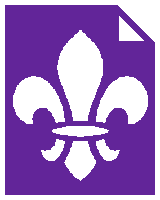Youth Input? No way!
What is the role of youth members in program planning?
"When short of ideas don't impose on your Scouts activities which you think they ought to like; but find out from them by listening or by questioning which activities appeal most to them." — Lord Baden-Powell in BP's Outlook
I went to my next troop meeting with some large sheets of paper and thick markers. I gave one to each patrol and asked them to make a list of things they wanted to do at Scouts that year. They eagerly got to work and covered their pages with ideas. Next, I posted the sheets on the wall and gave each Scout several small blue stickers. I asked them to use the stickers to vote via "dotmocracy". They each stuck their stickers next to the activities they wanted to do.
I took the sheets home that night and prepared use the results for making the troop program for the year. I counted the dots by each idea and made a list of the most popular ones. The popular items were LaserQuest, the movies, a trip to Wonderland, paint balling, indoor camps with catered food, and other similar ideas.
After thinking for a moment, I threw the list and the large sheets of paper in my recycle bin and planned the year's program.
The program was focused around campcraft, exploring, and first aid. At camp, Scouts cooked their meals as patrols, built pioneering projects, and went on hikes. It was an active Scout program with many badges earned. And it was also very popular. The Scouts told their friends about it, resulting in several young people, who had never been in Scouting before, joining the troop during the year. And almost everyone came back the next year. This growth, unprecedented in the recent history of the troop, was the result of ignoring the young input to the planning process.
Does this mean that BP was wrong? Is it that youth input is never useful? No, and far from it. There are many activities that could be part of a great Scout program — hiking, shelter building, canoeing, sailing, pioneering, orienteering, bike hikes, dutch oven cooking — far more than could be accomplished by a single troop. The Scouts should decide on the focus of their troop's program. Should we do a canoe trip, a hike, or a bike hike? Should we build a tower, a zip-line, or a bridge? The Court-of-Honour is the place to answer these questions.
The amount of planning responsibility given to the Scouts will depend on how developed the troop is. In a new troop, the Scouts will not know what a Scout program looks like. The Scouters' role is to run a good Scouting program to introduce them to what Scouting is. As the troop develops, the Scouts will know what sorts of things constitute a Scout program and will be able to take on increasing responsibility for planning.
As Scouters, our role is not to do whatever our Scouts want us to do. It is to ensure that a high quality, challenging Scout program is happening in our troops. Part of this is ensuring that the program is matched to the interests and abilities of our Scouts.
